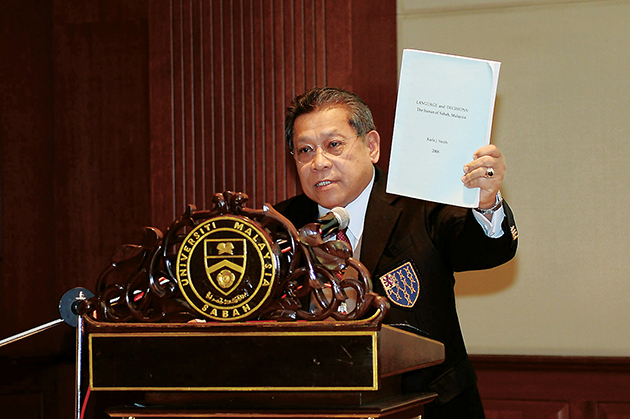What about other languages?
Published on: Wednesday, April 08, 2015

Kota Kinabalu: Parliament Speaker Tan Sri Pandikar Amin Mulia has demanded the Government raise the standards of all ethnic languages to that of vernacular schools as they face the threat of extinction due to the use of Malay. He said present efforts carried out by the Education Ministry and native leaders to preserve and protect native languages are still not enough, adding that the Chinese and Tamils in the country have better guarantees than the natives in the form of vernacular schools. "In Malaysia, there are two races whose language is guaranteed – the Chinese and the Tamils. But in India and China whose populations have hit billions, their languages could never become extinct," he said.
ADVERTISEMENT
Furthermore, Pandikar said the Education Ministry also allocated RM1.4 billion each year to vernacular schools, but there had been grouses raised in Parliament that the Government was not doing enough for these schools. "I am very sad and emotional that our government, whom our people (the natives) had also voted for and supported since Sabah's independence through the formation of Malaysia, would spend such an amount for vernacular schools but could not spare a few million ringgit for the natives in Sabah and Sarawak," he said. Pandikar said this during the launching of the Heritage Language Forum on Pre-schools, here, Tuesday.He had taken time out from the ongoing Parliament session to attend the forum as it "was a far more important issue" to him personally.
ADVERTISEMENT
Pointing out that the language makes the race and its people, Pandikar said the natives in Sabah and Sarawak have paid a huge price in losing their mother tongues over the past decades due to the adoption of Malay. Although Article 125 of the Constitution stipulates that the Malay language is the country's national language, Pandikar said it is still a foreign language in Borneo and its adoption had been primarily as an instrument to unite Malaysians during the formation of the country in 1963.
ADVERTISEMENT
He said at the time of the formation, many Sabahans were conversant in bazaar Malay, Dusun and Bajau, which were the primary languages used in the tamu, but the formation of the country further enforced the use of Malay through the Constitution. As a result of this, Pandikar who started schooling in 1960 admitted that as a fifth generation Iranun, he could no longer speak the language of his ancestors due to the widespread use of Malay since then. Now, the same problem is also passed down to his children who only communicate in Malay and English at home, he said, fearing the Iranun language will disappear altogether in a matter of time. He said the use of Malay was largely due to perceptions at the time that its mastery is required to attain education and perform well in school. But this wasn't so, said Pandikar, adding that it has been scientifically proven that the use of native languages in lessons would further improve the students' performance academically. He pointed out that the Chinese and Tamils placed in vernacular schools are doing much better than their Malay counterparts who use Malay as the medium in class. Recalling his days as Youth and Sports Minister in 1995, Pandikar said he had come to a self-realisation on the importance of preserving and protecting the native languages and of debating at length on the matter in the State Assembly. He said not all assemblymen shared his ideals and some sceptics had also called him a "racist" for his views. These days, Sabah had only become strong on the preservation of its traditional costumes and musical instruments due to the tourism sector, but not so much on its languages. Pandikar, who also funded two Iranun schools, said based on his experience the Education Ministry had also been poor in the preservation of native languages, although it is a basis of human rights recognised by the United Nations. At present, the present National Education Philosophy would only allow the use of the ethnic language as a language subject, if up to 10 parents requested that their children are taught, he said. For that, he said the two Iranun schools had not received any support from the ministry such as food or supply of milk to students, while the subject is only taught on a 'pass exam' basis and no more than that. "But this is not what I and all the other ethnic people want, we want the native languages to be used as a medium in all subjects," he said, suggesting that existing academic books be translated into the various native languages. According to Pandikar, education officers were not convinced that the use of native languages would boost the performance of students in schools so he challenged Universiti Malaysia Sabah (UMS) academicians to prove them otherwise. "For that matter, I really need UMS to come out with their own research and prove to the Education Ministry that such medium would help students excel in their studies," he said. Pandikar said given that UMS had set up the Kadazandusun Chair in 2003, they should not stop the work there and instead also establish the Bumiputera Ethnic chair as "the time now is right." He said there are no ethnic leaders in Sabah and Sarawak genuinely fighting for the preservation of the native tongues, saying many of them were too busy "building roads, bridges and ensuring everyone had water." "While the reasons for language extinction in many countries may vary, in Sabah it's the leaders who set the policies but the problem is they have not realised the importance of preserving the native tongues. "Datuk Dr Jeffrey Kitingan, Tan Sri Joseph Pairin Kitingan and Tan Sri Bernard Dompok don't realise this, even the Sarawakian leaders don't realise this, they are too preoccupied with building bridges and what not. Stay up-to-date by following Daily Express’s Telegram channel.
Daily Express Malaysia




